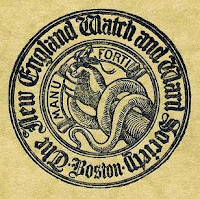In 1878 the New England Society for the Suppression of Vice was formed. For a $5 dollar contribution, anyone could belong.
One of it's first attacks on literature was against Walt Whitman's Leaves of Grass. First published in 1855. It was deemed obscene,’ ‘too sensual,’ and ‘shocking’ because of its frank portrayal of sexuality and some felt its obvious homoerotic overtones. Pressure from the Society caused Whitman's publisher to forgo reprinting the updated edition in 1881.
The city’s Watch and Ward Society was a puritanical group of private citizens active from 1878 to the 1920s. It made Boston a target of scorn and – unintentionally – heightened interest in the books and plays it banned.
Beginning in 1902, the Watch and Ward Society’s Secretary, J. Franklin Chase, a humorless Methodist minister, single-handedly censored dozens of books.
And by the 1920s, the Society had censored hundreds of books and plays. It forced the Boston Public Library to keep banned books in locked rooms.
The Society had an agreement with police, all complaints about indecent books were sent directly to the Society. If the Society thought the book was indecent, it notified Boston booksellers that they had three days to remove the book from their shelves or they could be arrested on obscenity charges.
Booksellers so feared the group that they refused to sell books on its list. Those who did were arrested, charged and fined. Plays deemed racy were performed in a sanitized Boston version.
Many now celebrated works were included in the ban. Here are a few.
Slaughter House 5/Kurt Vonnegut
Desire Under the Elms/Eugene O'Neill.
God's Little Acre 1933/ Erskine Caldwell
Memoirs of Fanny Hill 1748/ John Cleland
Elmer Gantry 1926/ Sinclair Lewis in 1926
Manhattan Transfer 1927/ John Dos Passos
Lady Chatterley's Lover/1929 D. H. Lawrence
Forever Amber by Kathleen Winsor (1944)
The Sun Also Rises & A Farewell to Arms/
Earnest Hemmingway
And of course films were also on the hit list
I Am Curious (Yellow) by Vilgot Sjöman (1967)
(I remember sneaking into the theater to see this with my girlfriends.)
Caligula by Tinto Brass (1979)
Even songs became targets.
Wake Up Little Susie by The Everly Brothers 1957
Beans in My Ears by the Serendipity Singers/1964
(a protest song indicating adults were not listening to children. banned because kids were actually putting beans in their ears!)
The Warren Court (1953–69) expanded civil liberties and in Memoirs v. Massachusetts and other cases curtailed the ability of municipalities to regulate the content of literature, plays, and movies.
The last major literary censorship battle in the U.S. was fought over Naked Lunch, which was banned in Boston in 1965. Eventually the Watch and Ward Society changed its name to the New England Citizens Crime Commission, and made its main emphasis against gambling and drugs and far less on media.
Would your book have been BANNED IN BOSTON?








